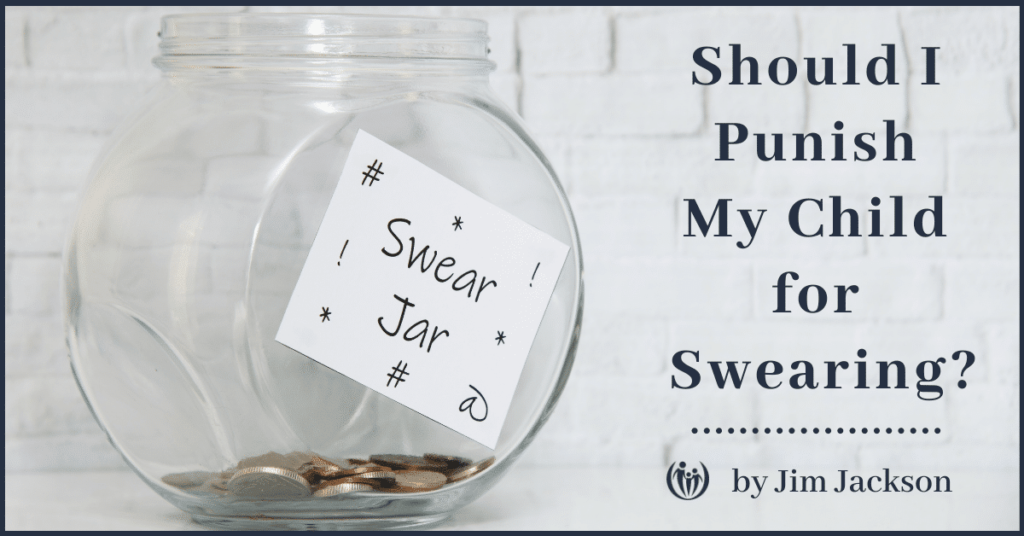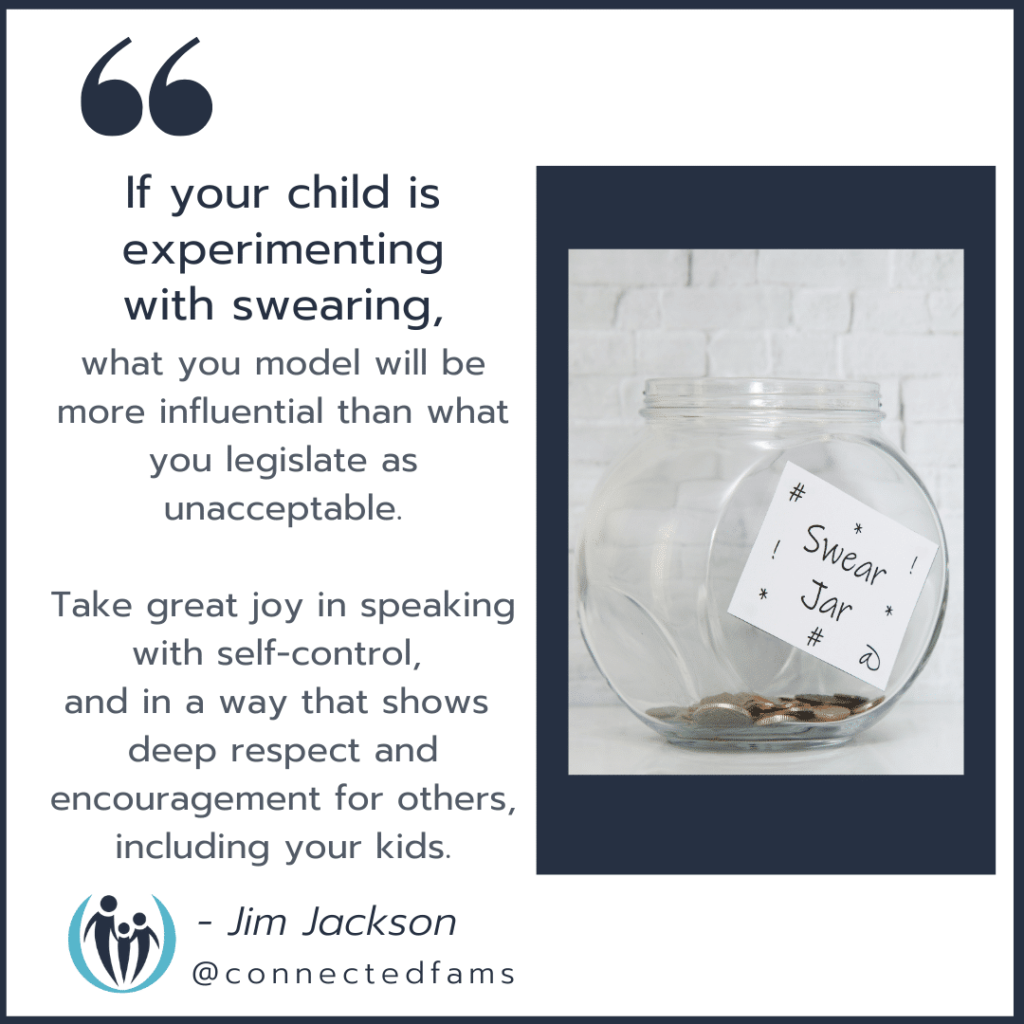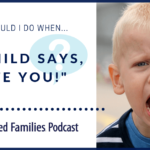
Should I Punish My Child for Swearing?

“S#*t,” “Oh My G-d.” …or “What the _____?” We’ve heard from numerous parents that this kind of language hurts their ears as well as their hearts. It’s tempting to do a search for “how to punish a child for swearing”, or “my child is swearing at school” so you can nip it in the bud. Instead, we encourage you to take a step back and breathe.
Coarse language and swearing is a common challenge. As kids get older they begin to flex their independence from parents. They are also often trying to fit in with peers they desperately want to impress. But when parents quickly dole out consequences, and find creative punishments for cursing, it can turn the challenge into a long-term power struggle where no one wins. In time, this power struggle can breed distance and resentment between you and your kids. When that happens, the peer influence usually grows even more powerful, and the wisdom and respect you desire becomes even more elusive.
But there’s another way! If this is a difficult issue in your family, here’s how you might respond more thoughtfully through the lens of the Connected Families Framework.
You are SAFE with me…even when you swear
To communicate emotional safety while addressing your kids’ word choices means coming alongside them as their understanding helper instead of their judge. (They can tell the difference!) Are your kids worried they won’t fit in? Do they even know what the words mean? Are they using these words to vent their own discouragement or anxiety?
In the same way, it’s helpful to understand what might be behind your angst when your kids say offensive words. Consider these questions:
- Am I worried people might think less of my kids (and me) because of how they talk?
- Am I concerned about my child’s faith journey?
- Will my child make bad choices in the future if they can’t control their tongue now?
- Do I feel hurt when my requests for respectful language are ignored?
Separating out your own anxiety or embarrassment from the conversation is an important aspect of being safe. With this insight, parents can then prepare for the discussion with a quick prayer, “Lord, help me be gentle in my effort to teach and train my child.” This helps parents stay inquisitive and relaxed rather than judging and demanding.
Lynne and I both have stories about times when we used coarse language in moments of poor self-control. And in some of those stories the kids heard us. Communicating the messages, “You are safe.” and “You are loved.” might require a confession about this struggle, and an invitation for forgiveness from the kids, if needed.

You are LOVED…no matter what you say
Calm and curious parents are better able to think clearly and can decide to approach the conversation in light-hearted, empathetic ways. This might sound like, “Wow! You have some strong feelings about this.” Or, “That’s an interesting word choice. Tell me more about that.”
When my kids used to frequently say, “I HATE….so and so or such and such,” I would say in a Yoda-like way, “Hmmm, Hate. A strong and dangerous emotion. Other words have you?” Over time as our kids felt joined and understood, they learned to use more constructive words.
If your kids are feeling pressured by peer culture to use crass or irreverent words, you’ll make more progress with a relaxed conversation. What are your kids worried about? Empathize and share the ups and downs of how you felt pressure to fit in with others.
[To learn how to strengthen your child’s resilience if they are experiencing rejection from others, read Helping Kids Thrive Despite Rejection From a Teacher or Students.]
Sometimes it’s entirely appropriate to be passionate and firm when talking about word choices with your kids, but it’s essential to discern: “How can I be sure to make my unconditional love land on my child’s heart, even though I feel strongly about this?”
You are CALLED and CAPABLE…of changing how you speak
Communicating to our kids, “You are safe and loved.” makes it easier to say encouraging things. Things like, “You have a strong opinion and I’m wondering how you could express it in more honoring ways?” Or, “Hmmm, are you actually talking to God when you say His name? Or is this something else?”
Keep it fun and light as you guide your child toward making better choices. When you are able to keep your sense of humor, it lays the groundwork for a more serious conversation. A conversation about taking responsibility for more honoring language.
Many times, our kids don’t yet value the calling to use words to be a blessing. Ephesians 4:29 says, “Do not let any unwholesome talk come out of your mouths, but only what is helpful for building others up according to their needs, that it may benefit those who listen.”
One of the best things we can do, instead of waiting for kids to use more appropriate language, is to affirm when they choose honoring language. When they are able to articulate their feelings in a constructive way, you can make statements about the value of this. It might sound like this: “I noticed you were frustrated but spoke with honoring words. That makes it easier for the people around you, including me, to appreciate what you have to say.”
You are RESPONSIBLE…for your actions and your words
When God’s name is spoken in vain or coarse language is used, there are natural impacts at play. Words either build up or can hurt/offend others. I learned how to teach natural impacts with grace one day when leading a wilderness trip for a group of high-risk teens.
Rough language was part of every conversation for them, particularly the misuse of the Lord’s name. I kept telling them to stop using that language, and they’d stop for a bit, but then forget. It was obvious my efforts to redirect weren’t helping, so I kind of let it slide in the name of “picking my battles.”
Our guide, Kathleen saw it differently and wisely chimed in confidently. “Hey, my friends,” gently smiling, “I’ve been listening to how you use God’s name and I thought you’d want to know how that impacts me.” She waited. The teens got quiet. They respected her and wanted to know. “I know it’s probably normal for you to talk that way. But I just want you to know that hearing God’s name used in an uncaring way hurts my heart because I love God very much. I just thought you’d want to know.”
That was all it took for the youth to choose more respectful ways to communicate over the next five days – because they were internally motivated to respect Kathleen. They were better able to take real responsibility because they understood the natural impact. When Kathleen’s sincere love for God shone through in graceful words the teens could not help but notice and respond.
Understanding the natural impacts of swearing
Another way to help kids understand natural impacts is to talk about times you slipped up and used coarse language. Maybe not swearing, or maybe yes, even swearing. 😉 Kids are far more open to hear about what we learned when we messed up than they are to hear about how they should get it perfect just like us! After you tell your story, ask your child, “Whose feelings may have been hurt by the way I talked that time?” If you lead with humility, you can usually have an open conversation about how your language might affect those listening.
Matthew 12:34b, says, “…For out of the abundance of the heart the mouth speaks.” After you’ve shared your story, try asking your child what this word choice may have revealed in your heart. This will invite your kids to examine their own hearts when they slip up by asking themselves, “What’s going on under the surface? Why do I feel the need to talk this way?”
The more you model this type of response to your child, the more they will realize that what you are really saying to them is this: “I care more about what’s in your heart than about disciplining your word choice.”
My child is still swearing. Now what?
Despite our best efforts to communicate these four important messages, our children may continue to use words we don’t like. Making this issue a battleground is often more destructive than helpful. Parents can instead choose to be peaceful, and model honoring word choices. Try to focus on the “Yes” and what we do as Christ-followers instead of the “No” or “Don’t”.
Often, kids who understand God’s wonderful grace and their calling to a life of significance, begin to make more honoring word choices.
Daniel was in middle school when he began to experiment with using language that was not honoring. He used this language frequently in an attempt to fit in with his peers. It grated on our ears and we addressed it numerous times. We encouraged him to use his words to honor others and build them up. This habit continued for quite some time, but we kept our focus on God’s love and Daniel’s calling to be a blessing to others. As this identity took root, we watched him grow to have an incredibly deep compassion for people, become very careful to make honoring word choices, and live his life to be an agent of God’s blessing.
Parenting with the long game in mind
Try to remember that you are parenting with the long game in mind. What you model will be much more likely to stick with your kids than what you legislate as unacceptable. If you take great joy in speaking with self-control and in a way that shows deep respect and encouragement for others (including your kids), that is what will have the greatest impact.
“Finally, brothers and sisters, whatever is true, whatever is noble, whatever is right, whatever is pure, whatever is lovely, whatever is admirable—if anything is excellent or praiseworthy—think about such things. Whatever you have learned or received or heard from me, or seen in me—put it into practice. And the God of peace will be with you.” Philippians 4:8,9
Download our FREE in-depth ebook Helping Kids With Anger. It will provide thoughtful insights and creative ideas to help your struggling child.







